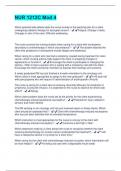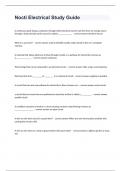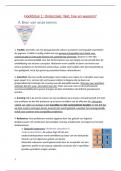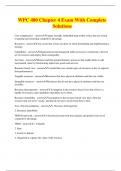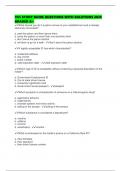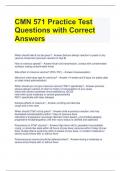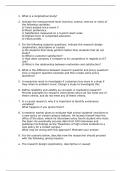Week 1
David Hume
o He wants to get rid of the worst part of religion
Emmanuel Kant
o Wants to reform religion; this critique of religion is the best for religion - should become what it
ought to be
o Most scholars of religion teach at secular university and they don’t see themselves teaching to
people of the same faith
o Religions have a place in the modern world; put some people think the world would be better with
out it
o Believing something is: taking it to be true
o Religious belief is a subset of ordinary belief (no more special than any other beliefs)
o Don’t put faith and belief together
o Faith is beyond proof or is not able to be provable
o Belief is being able to prove something
o How do we think of belief ordinarily?
Justification:
o Rationalization: you want something to happen (the case) find mechanism to believe it
o Justification: to give reasons for having a belief (if there are reasons for me to have the belief -
everyone else could have the same reason) - a much more impersonal thing than false
consciousness
o Evidence: something to justify a belief
Week 2
Review
Theologian study's higher entities
Scholars of religion try to understand the human phenomenon (They study theologians) : Why they
believe and How they believe? Justification -The way they believe in God and their justification for
it
Two beliefs (against religion and reform for religion)
o Intolerant Radical Critique: Religion does not have a place in science, modern pregressive world
o Tolerant Reformist Critique: Religion has fallen short by priest and people that corrupt the
practice but it can be reformed
o Liberation Critique Beneficial: once we reform religion it can be reinforced, promoted and
encouraged (make sure religion does no feed into its impulses – negative one)
You could never be justified to believe in God in a intolerant radical critique
Normative vs. Descriptive
o Rationality is Normative
o Definition of Descriptive language: your words to matching with the world (lining up)
o Definition of Normative: combined prescriptive (prohabition-don’t do this while doing that)
language and evaluative language (I may proscribe or evaluate; maybe you should do this)
(there is a view that we ought to do or good or bad)
"Ethics" of Belief
o Procedural question of belief (what do we do when create a belief in the right way?) - good
person that is able to perform a belief
o Ethos
, Ethos (/ˈiːθɒs/ or US: /ˈiːθoʊs/) is a Greek word meaning "character" that is
used to describe the guiding beliefs or ideals that characterize a community,
nation, or ideology.
o Mo·resˈmôrāz/ noun
the essential or characteristic customs and conventions of a community.
"an offense against social mores"
o Morality and Ethics describe our duties in the role we play in a community
o Good Character Traits: interns of our virtues (what parts of ourselves do we want to develop to
become the best versions of ourselves)
o Ethics of belief: the duties and obligation you have when you believe in something
o What do we do for belief
Practice in forming the belief
Keeping the belief
Updating the belief
Hume on Miracles
o Wrote a book during censored times of the government
o In the book we deal with belief before religious belief
o Wise man: proportions his belief to evidence (general rule for everything in the book) - his
proportionality claim (observation or experience for the justification of belief) - a duty
o Weighing the possibilities for beliefs;
o The requirement for Humes proportionality claim is to look at both sides (weigh for and against)
(pros and cons) - certainty of belief, non-belief, confidence, low degree of confidence
o The idea of the wise man or woman is that they will weigh the pros and cons and then make a
decision
o Experience, Testimony
o Miracle
Violation against the laws of nature; contradicts the workings of the world
The evidence against a miracle is everything because it does not happen
You shouldn’t create beliefs against the side of more tangible evidence
Clifford's Demand for Evidence
o Comparison to holding a belief you are not entitled and holding property that you are not
entitled
o Just as we cannot trust the thief, we cannot trust the person that steels beliefs
o In our society where rely on each other for information; there is always a harm if not everyone is
creating belief in a rational way (not eveyone is reliable)
Solma Challenge
o Forming a belief in-voluntary – we can only be responsible to things that are in our control
o What he is going to say is about the human. What are human meant for (virtues)
o Propper functioning of the human depends on what you see the human being aspects all
together
Having a higher power belief makes you believe that you have a higher purpose as a human
Week 3
Religious experience as a Justification for Religious belief
o Review: what is the evidentialist atheist for getting rid of religious belief?
o To show arguments of whether God exist or Not; you show the irrationality and morally wrong to
believe in God to prove that he does not exist
o It is always wrong to hold beliefs without evidence (a categorical imperative)
Holding your beliefs illegally against rational thought of evidence is the way to prove religious
believers wrong – religious believers violate good belief formation – believe you need adequate
evidence (proportional belief)
David Hume
o He wants to get rid of the worst part of religion
Emmanuel Kant
o Wants to reform religion; this critique of religion is the best for religion - should become what it
ought to be
o Most scholars of religion teach at secular university and they don’t see themselves teaching to
people of the same faith
o Religions have a place in the modern world; put some people think the world would be better with
out it
o Believing something is: taking it to be true
o Religious belief is a subset of ordinary belief (no more special than any other beliefs)
o Don’t put faith and belief together
o Faith is beyond proof or is not able to be provable
o Belief is being able to prove something
o How do we think of belief ordinarily?
Justification:
o Rationalization: you want something to happen (the case) find mechanism to believe it
o Justification: to give reasons for having a belief (if there are reasons for me to have the belief -
everyone else could have the same reason) - a much more impersonal thing than false
consciousness
o Evidence: something to justify a belief
Week 2
Review
Theologian study's higher entities
Scholars of religion try to understand the human phenomenon (They study theologians) : Why they
believe and How they believe? Justification -The way they believe in God and their justification for
it
Two beliefs (against religion and reform for religion)
o Intolerant Radical Critique: Religion does not have a place in science, modern pregressive world
o Tolerant Reformist Critique: Religion has fallen short by priest and people that corrupt the
practice but it can be reformed
o Liberation Critique Beneficial: once we reform religion it can be reinforced, promoted and
encouraged (make sure religion does no feed into its impulses – negative one)
You could never be justified to believe in God in a intolerant radical critique
Normative vs. Descriptive
o Rationality is Normative
o Definition of Descriptive language: your words to matching with the world (lining up)
o Definition of Normative: combined prescriptive (prohabition-don’t do this while doing that)
language and evaluative language (I may proscribe or evaluate; maybe you should do this)
(there is a view that we ought to do or good or bad)
"Ethics" of Belief
o Procedural question of belief (what do we do when create a belief in the right way?) - good
person that is able to perform a belief
o Ethos
, Ethos (/ˈiːθɒs/ or US: /ˈiːθoʊs/) is a Greek word meaning "character" that is
used to describe the guiding beliefs or ideals that characterize a community,
nation, or ideology.
o Mo·resˈmôrāz/ noun
the essential or characteristic customs and conventions of a community.
"an offense against social mores"
o Morality and Ethics describe our duties in the role we play in a community
o Good Character Traits: interns of our virtues (what parts of ourselves do we want to develop to
become the best versions of ourselves)
o Ethics of belief: the duties and obligation you have when you believe in something
o What do we do for belief
Practice in forming the belief
Keeping the belief
Updating the belief
Hume on Miracles
o Wrote a book during censored times of the government
o In the book we deal with belief before religious belief
o Wise man: proportions his belief to evidence (general rule for everything in the book) - his
proportionality claim (observation or experience for the justification of belief) - a duty
o Weighing the possibilities for beliefs;
o The requirement for Humes proportionality claim is to look at both sides (weigh for and against)
(pros and cons) - certainty of belief, non-belief, confidence, low degree of confidence
o The idea of the wise man or woman is that they will weigh the pros and cons and then make a
decision
o Experience, Testimony
o Miracle
Violation against the laws of nature; contradicts the workings of the world
The evidence against a miracle is everything because it does not happen
You shouldn’t create beliefs against the side of more tangible evidence
Clifford's Demand for Evidence
o Comparison to holding a belief you are not entitled and holding property that you are not
entitled
o Just as we cannot trust the thief, we cannot trust the person that steels beliefs
o In our society where rely on each other for information; there is always a harm if not everyone is
creating belief in a rational way (not eveyone is reliable)
Solma Challenge
o Forming a belief in-voluntary – we can only be responsible to things that are in our control
o What he is going to say is about the human. What are human meant for (virtues)
o Propper functioning of the human depends on what you see the human being aspects all
together
Having a higher power belief makes you believe that you have a higher purpose as a human
Week 3
Religious experience as a Justification for Religious belief
o Review: what is the evidentialist atheist for getting rid of religious belief?
o To show arguments of whether God exist or Not; you show the irrationality and morally wrong to
believe in God to prove that he does not exist
o It is always wrong to hold beliefs without evidence (a categorical imperative)
Holding your beliefs illegally against rational thought of evidence is the way to prove religious
believers wrong – religious believers violate good belief formation – believe you need adequate
evidence (proportional belief)

